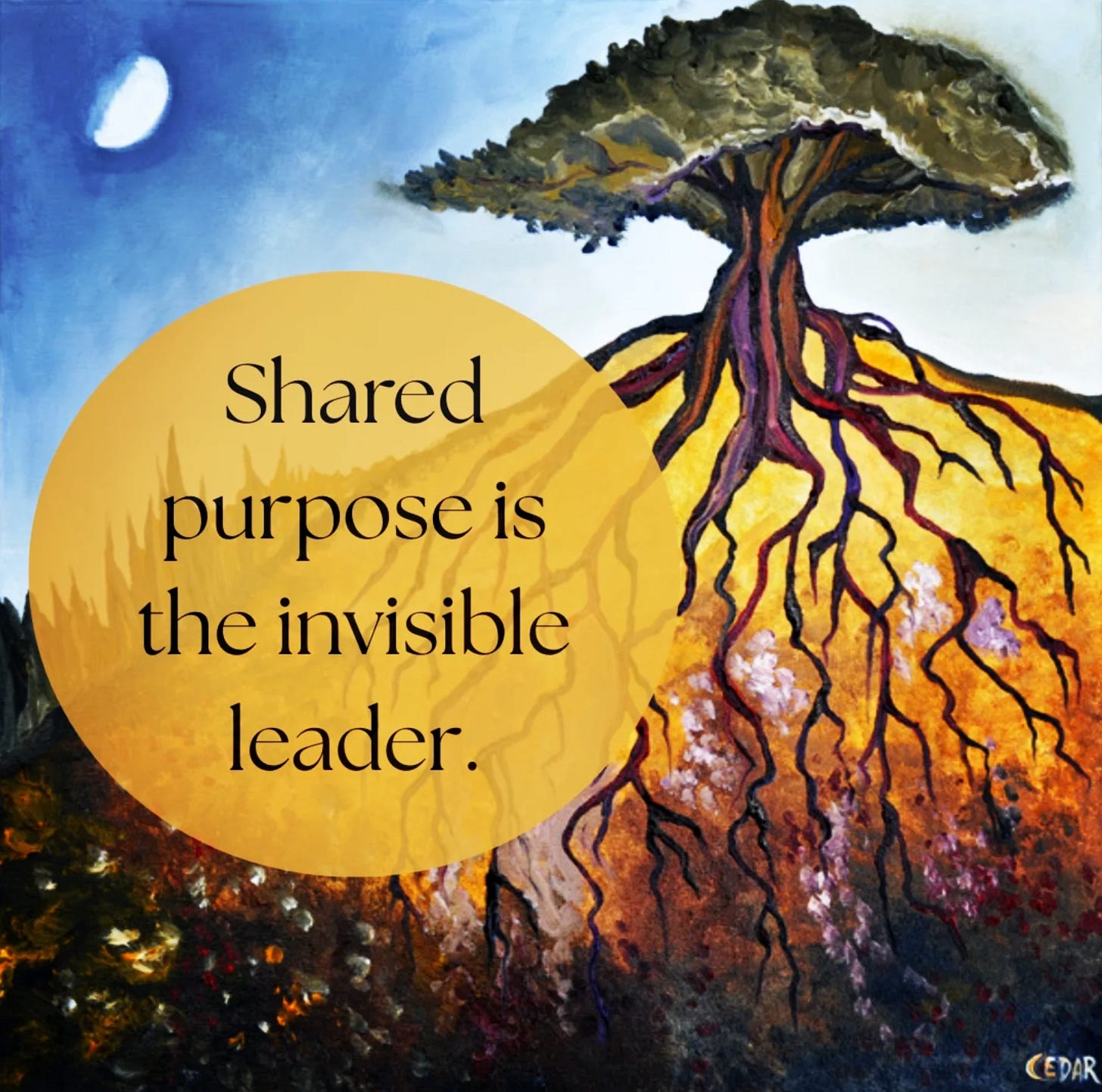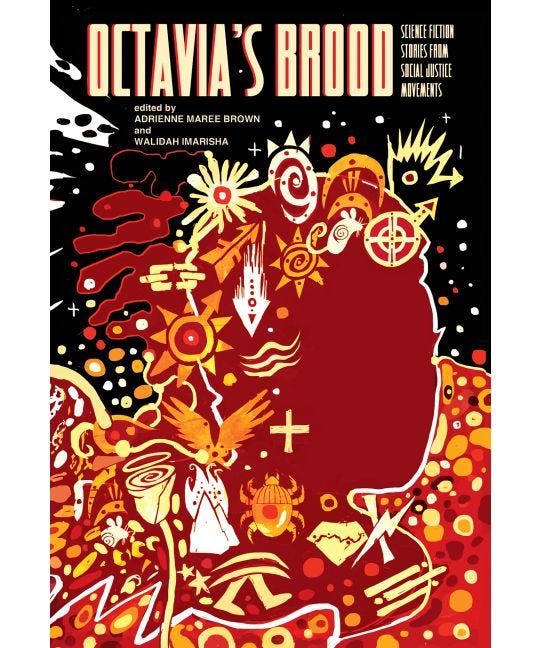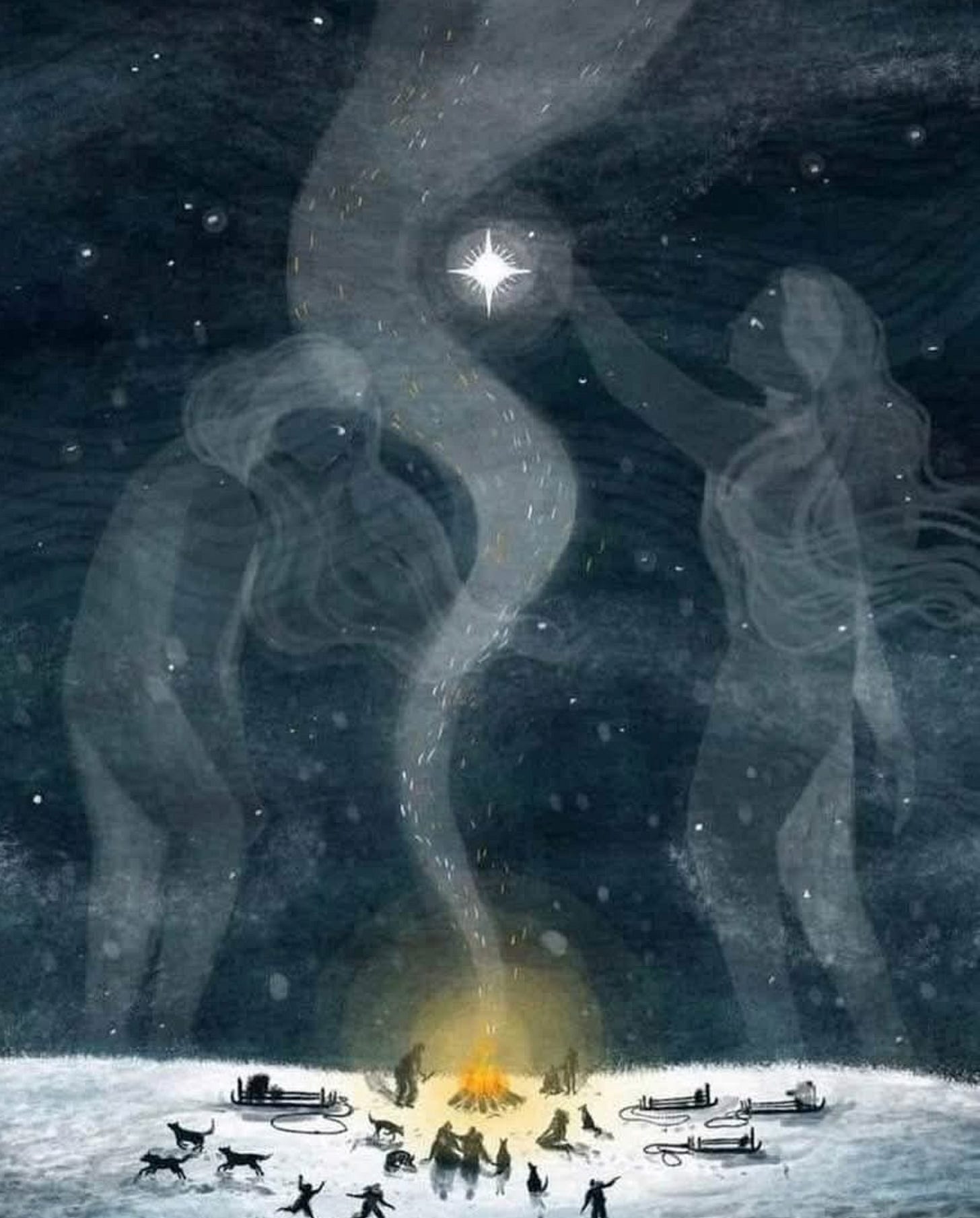Stories can be Seeds, Stories can be Weapons
Protecting our Radical Imagination as we Birth a World of Multi-species Flourishing
Our world changes when we dare to ask what if …
Shared purpose is the invisible leader.
Wise leaders facilitate a process that strengthens everyone's agency and commitment to that shared vision, resulting in the flourishing of multi-species and polycultures that benefit many.
Nefarious leaders manipulate and coerce people into a shared vision that devolves into thought-terminating cliches, which ends in a culture of fascism, domination, and monocultures that benefit very few.
Story is a powerful catalyst for articulating and uniting people in service to a shared purpose. Story is the vessel for shared vision. As Tyson Yunkaporta says in this provoking conversation,"Story is a psycho-technology; how Indigenous people safely store this cultural data and mechanisms for relational accountability for the long term through relationships."
The most effective leaders are the storytellers, the ones who can speak and sing the vision of the future they call the people to unite towards. We carry those ancestral storytellers forward with quotes and essays, using their visionary North Star words to guide us toward a new world.
Yet we also shiver from the bone-chilling fear from the stories that have led people to do unspeakable horrors in the name of God, Nation-State, empire, or monarch.
Stories can be seeds.
Stories can be weapons.
Stories can be a fractal of holistic cultural bundles infused with time-honored wisdom. Still, they can also be mind-numbing propaganda as a tool of psychical coercion towards a dystopic totalitarian future. Our news feeds become doom-feeds, serving us the stories that try and kill our creativity, resistance, and radical imagination. We have never evolved to handle this much information, let alone the many tragic stories that emerge from the breakdown of cultural relational accountability. But here's the thing: we still continue to consume it. Social media and the internet can become a creativity-terminating space where we are inundated with stories of doom and gloom that relegate us into states of functional freeze.
Under the influence of creativity-terminating stories, people have been so heavily indoctrinated into the story that upholds the capitalist and technofeudalist system, so much so that they think its rules are like that of nature, such as gravity; it's a given and a non-negotiable. This capitalist realism is a response to the inability to imagine an alternative to capitalism. Capitalist realism is more than the sense that there is no alternative to capitalism. It’s a response to that sense, a reaction to losing a sense of possibility, a resignation or fatalism. Yet, capitalism is only a few centuries old, in contrast to the millennia that humans have been living on the Earth. This imagination-terminating system has erased whole bodies of memory of embodied cultural economies with its overwhelming flood of media and stories that blind us to the myriad of other ways we can live and resource each other.
This meta-amnesia has influenced modernity so much that many can more easily imagine the end of the world before they imagine the end of capitalism.
In an essay I read recently titled "Stalin and the Art of Boredom," I was reminded how empires, across time, use propaganda to bore you into submission by filling up your brain with useless information to stop your radical creativity. Catastrophizing is exhausting and designed to thwart our movements.
from OnBeing says in this essay: "We’re muting our news feeds because the stories they tell are not just informing us but shaping us, taking hold of our minds and hearts and nervous systems and limiting or galvanizing forces of hope and despair, groundedness and action." Staying on the outrage wheel and obsessing over what you don't want in the world prevents you from engaging in the radical imagination it takes to make the world you wish to possible.That is why supporting independent artists in platforms like these is more important than ever, as we move into uncharted ground of worlds collapsing. We need to re-seed our imaginations of what is possible for the next world we are birthing, and we do it out loud in spaces like this so that we can unite under this shade tree of story that carries ancestral brilliance.
Creativity and imagination are muscles that must be strengthened. The powers that be would rather see them atrophy.
Radical imagination is the courage to envision a future that is entirely unlike the world we have today. It doesn’t react to or get discouraged by current realities.
“My father used to tell me that stories offer the listener a chance to escape but, more importantly, he said, they give people a chance to maximize their minds. Suspend ordinary constraints, allow the imagination to be freed, and we are charged with the capability of heightened thought. Learn to use your eyes as if they are your ears, he said, and you become connected with the ancient heritage of man, a dream world for the waking mind...... Stories are a communal currency of humanity.”
― Tahir Shah, In Arabian Nights: A Caravan of Moroccan Dreams
Despite the magnificent creatives working towards a radically beautiful future against all odds, the liberal left offers no unified vision of the future, only the status quo. The right does ( even though it's a horrifying, bigoted one), and that's what unites them.
As someone who holds a lot of trauma in the earth of my body, I struggle with the sensory overwhelm of many social activist spaces, including crowded protests, rallies, and frontline direct action. I am reminded repeatedly that the frontlines of transformation are everywhere, and mine are often here with pen and paper, camera and seeds. A relational way to shift meta-culture towards something life-affirming once again. I wrote about that here in an essay about Diverse Islands of Coherance.
We have to protect and strengthen this capacity to dream and imagine. It is a radical act.
As a lifelong apprentice to seeds, which embody the essence of life-affirming transformation, I am in awe of their endless generative creativity. Kening Zhu shares that "Generative creativity is creativity that inspires more creativity. It is a seed that grows more seeds." Stories are seeds. And they hold the capacity for endless generative creativity, which catalyzes social change. Suppose the shared purpose is the stories the doulas and midwives carry to shepherd a new world. What are we doing to support those caring for those seeds, those stories ( old and new) that enspark movements, that awake people from the slumber of the heart-numbing realities of late-stage capitalism?
More than ever, we need the spirit of our radical imagination and creativity to go "mycelial" ( my version of the term "viral"). We need stories to garner the courage of all of us growing as cultures of transition towards a radically liberated world. We need a united vision of the future of
Writing small for Enduring Impact:
"The bigger the issue, the smaller you write: You don't write about horrors of war. No. You write about a kids burnt socks lying on the road. You pick the smallest management part of the big thing and you work off the resonance" - Richard Price.
I committed to a 10-year practice of writing small little love poems to the world, pairing photographs with words to seed a little reverent curiosity into the world through the strange digital fire of social media. In that period, I wrote nearly 300 little photo notes a year on my Instagram, which strengthened the muscle of my radical imagination. It was a tiny experiment that ended up being a lifeline for me when the world looked bleak; I could use my camera and my pen and my imagination to re-enchant the world again. This is the practice of Reverent Curiosity. Just as much as we need everyone to bear witness and speak truth to the layers of despair and injustices we see across the globe, we also need to bear witness and sing praises to the million everyday brilliances of life continuing against all odds. I wrote about my practice of Reverent Curiosity here.
How might we heal fractured worldviews with intimate immensities, such as a daily practice of reweaving the relationality of the world back together inside ourselves and the way we see ourselves in the world? What role do we play as story catchers and story weavers?
I will host the first of many circles for those who want to strengthen our radical creativity muscles and lean into our reverent curiosity. The invitation is here.
Why I Read and Write Radical Speculative Fiction:
When I was 16, I had the blessing of a teacher named Mr. Elms, who introduced our English class to the world of speculative fiction. It wasn't the robot and alien-infused science fiction; it was Ray Bradbury, Kurt Vonnegut, George Orwell, and Ursula K LeGuin.
As I grew into a mother, I soon discovered forms of speculative fiction by women of color such as Octavia E. Butler and adrienne maree brown. Birthing worlds with words and images that I wanted for my kids. Reading Octavia E Butler's Parable of the Sower led me to discover a whole new generation of people writing from this lens, such as this anthology of science fiction stories from social justice movements:
"Whenever we envision a world without war, without prisons, without capitalism, we are producing speculative fiction. Organizers and activists envision, and try to create, such worlds all the time. Walidah Imarisha and adrienne maree brown have brought twenty of them together in the first anthology of short stories to explore the connections between radical speculative fiction and movements for social change. The visionary tales of _Octavia’s Brood_ span genres—sci-fi, fantasy, horror, magical realism—but all are united by an attempt to inject a healthy dose of imagination and innovation into our political practice and to try on new ways of understanding ourselves, the world around us, and all the selves and worlds that could be. The collection is rounded off with essays by Tananarive Due and Mumia Abu-Jamal, and a preface by Sheree Renée Thomas."
My adventures in reading a diversity of authors of speculative fiction with a social justice lens have inspired me in my forthcoming book projects. One of them is historical fiction meets magical realism meets speculative fiction. It is being written from a perspective of Deep Time, Indigenous cyclical time, going back and forth across the loom of the ages. In the coming months, I will share snippets of these chapters as they grow from the seeds I am sowing on the pages.
Even if we have done our best to curate them carefully, our newsfeeds are often full of stories tearing down old paradigms and structures fueled by our hatred of what oppresses us. I often seek to sow seeds of hope and imagination in the social feeds to remind people of Deep Time diligence and the power of story to move us towards hope rather than despair.
One of the best seeds of advice given to me years ago by a treasured elder and mentor John Trudell who said: "No matter what they ever do to us, we must always act for the love of our people and the earth, rather than react out of the hatred of our oppressor."
My mentor Martin Prechtel states beautifully: "Metabolism is where things start to break down; composting is where things start to come together. Metabolism is revolution; composting is culture re-emerging. .....When the only thing holding you up is what you hate, then when what you hate disappears, you die with it. You’re dead. As long as you think that you’re better than everyone else and are going to fix everything, then you’re dependent on your enemy for your identity. Struggling for what you Love is very different than Fighting Against What You Hate."
Radical imagination, creative visioning, and speculative dreaming of our future is an act of love; love for our children yet unborn and those descendants we may never meet. A sprouting of a time beyond our own that allows for multi-species flourishing.
I seek to read and write stories that are dystopia-metabolizing living beings that help us hold the grief of this world in transition. How can the pages of our books be houses for the Holy ones that inhabit our realms and animate us with renewed commitment to fight and love for an enchanting world for our descendants.
Grief, if undigested, turns into a nightmarish landscape of a future of broken-hearted humans lashing out at the world in a final act of terror that reflects the million betrayals and failures of a people disconnected from land and the stories it holds. Nefarious leaders like to weaponize this grief into stories that manipulate and exploit.
I want to carry stories like the old ones did, where spirits inhabit the pages, where we make offerings to the ones who live inside the Storywater of memory and time carried down the generations, enlived with our breath and song.
I don’t want a president or a congress born from a culture with dystopic stories; I want a council of Indigenous elders who hold relational accountability in the very fabric of the stories they tell around the fires that hold the memory of Deep Time and kincentric culture. We will rehydrate these stories with our pen, paper, and deep listening.
“The engineers of the future will be poets.” -Terence McKenna
What are you doing to use your writing, creativity, and radical imagination to facilitate and illustrate the shared vision of a world with multi-species flourishing? Reply and tell us below, or share links of those who are sowing seeds of a radically transformed future.







Such a good reminder, Rowen. How easy it is for us to forget. I am reminded of Chimamanda Ngozi Adichie and the beautiful way in which she highlights the danger of a single story. Modernity attempts to narrow all down to a boring, fear-based story of scarcity, of “us” vs. “them”. We are so much more than that. And all of us are stories, or, “ecoversities” as my friend Manish Jain often says. Thank you for keeping the stories alive, along with the seeds. A deep bow to you.
Rowen would you consider doing a voiceover of this piece? I’d love to have it in the air of my studio with me 💚